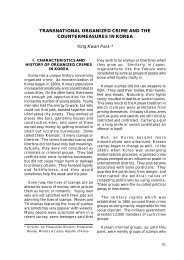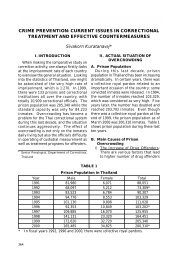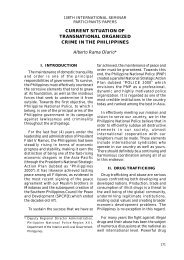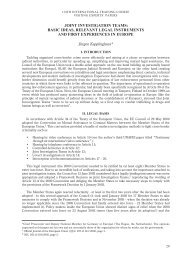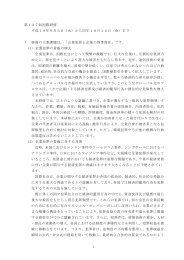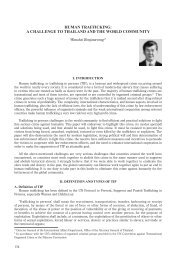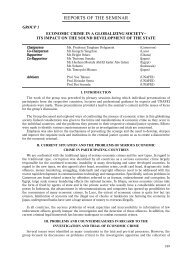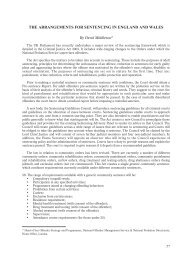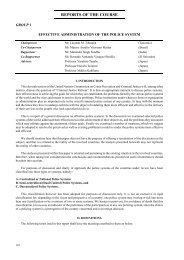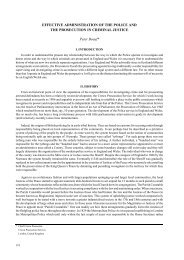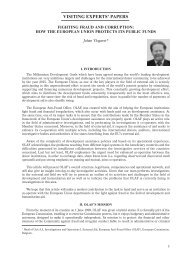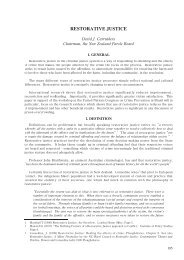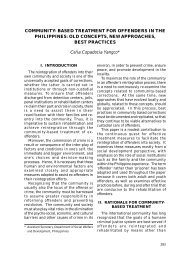CANADA'S ANTI-MONEY LAUNDERING REGIME Daniel P. Murphy *
CANADA'S ANTI-MONEY LAUNDERING REGIME Daniel P. Murphy *
CANADA'S ANTI-MONEY LAUNDERING REGIME Daniel P. Murphy *
Create successful ePaper yourself
Turn your PDF publications into a flip-book with our unique Google optimized e-Paper software.
RESOURCE MATERIAL SERIES No. 58of Crime (Money Laundering) Act 18 . Thisnew law is now being implemented over asuitable transition period. Prior toexamining these new provisions it isimportant to consider other legaldevelopments.IV. INCREASED PRIVACYEXPECTATIONSPrivacy expectations of Canadians havesignificantly evolved since 1993 when thefirst Proceeds of Crime (money laundering)Act came into force. The precursor toincreased privacy expectation is seen inconstitutional protections in Canada’s 1984Charter of Rights and Freedoms.17 The common law established an expectation ofconfidentiality between a financial institution andits client. A reporting concept was a voluntaryobligation in light of the confidentiality relationshipbetween a financial institution and its client.Section 462.47 of the Criminal Code (see http://canada.justice.gc.ca/en/laws/C-46/36036.html#rid-36081) developed the voluntary reporting theoryby providing as follows :“For greater certainty but subject to section 241of the Income Tax Act, a person is justified indisclosing to a peace officer or the AttorneyGeneral any facts on the basis of which thatperson reasonably suspects that any property isproceeds of crime or that any person hascommitted or is about to commit an enterprisecrime offence or a designated substance offence.”18 The most important development was thesignificant revision to the FATF’s Recommendation15. Its predecessor called upon States to considera requirement to report suspicious transactions tocompetent authorities. Canada’s voluntaryreporting regime could be said to comply with theearlier recommendation. It did not comply withthe revised recommendation which states, asfollows:15. If financial institutions suspect that fundsstem from a criminal activity, they should berequired to report promptly their suspicions tothe competent authorities.Subsequently, the courts have adopted anexpansive interpretation of an individual’sreasonable expectation of privacy. 19 Thisdevelopment evolved as courts interpretedthe scope of s. 8 of the Charter in variouscases.Concomitantly, privacy expectationsbecame the banner for significant changesas a result of the explosive growth of theInternet and the need to protect electroniccommerce. This led to a new law that hasa direct impact on every business inCanada. The Personal InformationProtection and Electronic Documents Act 20 .It came into force on January 1, 2001. Itspecifically covers banks; other federallyregulated financial institutions; and otherfederal business organizations.Transitional provisions provide that all19 For many years the leading case on bank secrecywas the Tournier v. National Provincial Bank ofEngland, [1924] 1 K.B. 461 (C.A.). See alsoCanadian Imperial Bank of Commerce v. Sayani[1994] 2 W.W.R. 260 (B.C.C.A.). In a 1993 case, R.v. Plant (http://www.canlii.org/ca/cas/scc/1993/1993scc96.html), the Supreme Court of Canadaheld that s. 8 of the Charter protected abiographical core of personal informationmaintained by a commercial enterprise in certainscenarios. In Plant the police obtained hydroconsumption records from a city utility companywithout a search warrant. Justice Sopinka, for themajority, opined on the issue of access to commercialinformation as follows :“The United States Supreme Court has limitedapplication of the Fourth Amendment (the rightagainst unreasonable search and seizure)protection afforded by the United StatesConstitution to situations in which theinformation sought by state authorities ispersonal and confidential in nature: UnitedStates v. Miller, 425 U.S. 435 (1976). That casedetermined that the accused’s cheques,subpoenaed for evidence from a commercial bank,were not subject to Fourth Amendmentprotection. While I do not wish to be taken290



